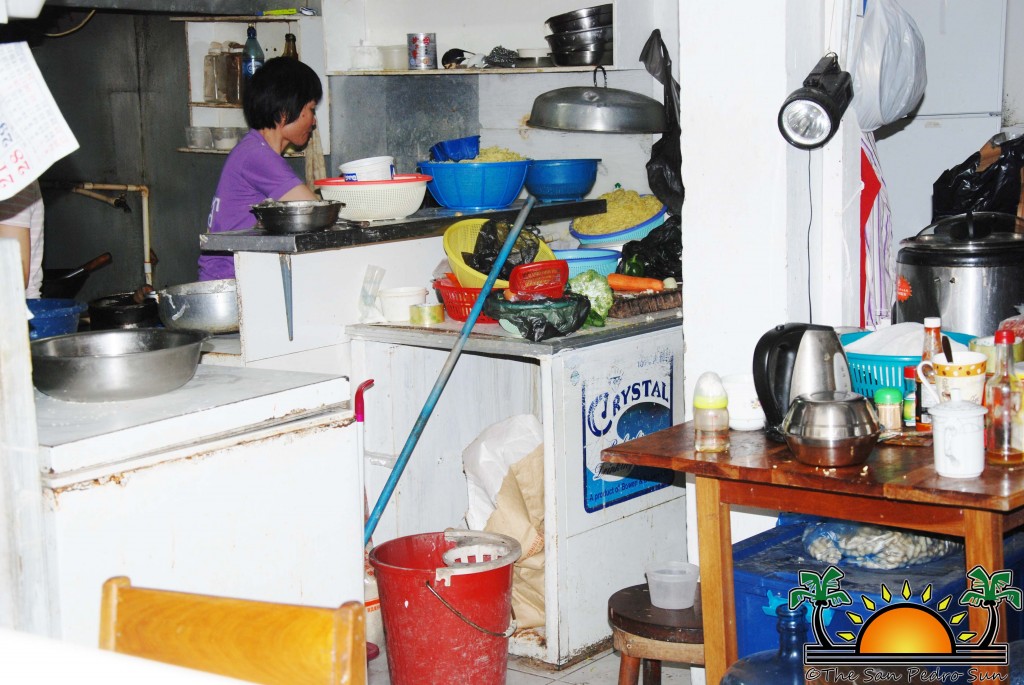San Pedro is blessed with various restaurants, delis, shacks, vendors and bakeries serving mouth-watering food and treats. But has anyone ever questioned what happens behind closed doors? Though unpleasant to think of, there have been cases where food poisoning and other unsavory issues have arisen. When it comes to food safety, the Health Department in San Pedro is strict about its rules and regulations.
The Public Health Bureau has standard policies where each food establishment must be inspected at least three times per year. Health Inspector for San Pedro and Ambergris Caye, Horris Patten, has been serving the island for seven months now. His main responsibility includes periodic health inspections, to ensure that the general public is safe from contamination, food-borne illnesses and diseases.
The health department lays out protocols that eateries must adhere to. Before any new establishment begins to operate, the person must come to the public health department to get a clearance. Then the inspector will examine the establishment to make sure that the premise is clean, free from dampness/mold, septic tanks that have no leaks, that there is no infestation from pests and rodents. If the establishment is a restaurant, they must have two restrooms, one for males and one for females. If requirements are met, the health department then issues out a clearance and then they are allowed to go to the Town Council and apply for a trade license to operate.
A restaurant cannot operate without the help of chefs, prep cooks, and dishwashers. The Ministry of Health (MOH) insists that all employees who come in contact with food to obtain a valid food handlers permit. “I recommend any eatery to employ people who are trained, and that possess a food handler’s permit. When you have trained personnel, it enhances the establishment’s performance,” said Patten. The MOH trains food handlers by educating them about general food safety, proper appearance and store, importance of using aprons, hair nets, enclosed footwear, how to properly prepare food and store it, and temperature control. After the training is completed, each food handler should be equipped with basic knowledge.
“I would like the community to realize that public health is based on science, not based on the public health department itself. For example, an apron is the barrier between the food handler and food. Enclosed footwear prevents the entrance of worms, as parasites enter your system through your feet. So if workers are wearing slippers, the food handler can pass parasites on to the person who will consume their food. Food handlers must always wash their hands with soap and water after using the bathroom. They should not be collecting money if they are touching food,” said Patten.
According to the register created by the San Pedro’s Dr. Otto Rodriguez Polyclinic, a common illness that is recurrent within patients is gastroenteritis, which causes vomiting and diarrhea. Gastroenteritis is a result of the improper handling of food, and is linked to not washing hands, with house flies touching food, poor personal hygiene, and unclean surfaces. Patten stated that outbreaks such as E. coli and salmonella have not been identified because the lack of laboratory equipment cannot confirm such cases. Another area of concern is water. Patten explained the importance of safe water and the Health Department strongly encourages the public to drink and use potable water. A waterborne illness that is apparent in unfiltered water is Hepatitis A-a virus that causes liver disease. Hepatitis A is also transmitted through ingesting food or water that is contaminated, or those who come into contact with infected persons. Patten recommends water sources from “BWS” and “Crystal” water companies as safe. To make water safe at home, one may add 2 drops of bleach to 1-litre of water, 8 drops of bleach to 1 gallon, ½ teaspoon of bleach to 5 gallons, then shake well, and leave for 30 minutes.
Another health issue at hand is allowing dogs in eating areas. One common practice among island residents is taking their dogs with them where ever they go, including restaurants. While restaurants in America usually promote their businesses as “pet-friendly’, according to Patten, “there is no food establishment in the country of Belize that is officially classified as pet friendly. It is not acceptable, and there is various reasons why we don’t tolerate animals in eateries. Dogs can carry rabies, fleas that cause sores, ticks that lead to Lyme disease, and tapeworms.” Apart from the many diseases that humans can contract from dogs, the inspector Patten discussed the challenges animals bring into food establishments. Some of the sanitation measures the health department observes is when people may be allergic to animal hair, and sometimes excessive barking from dogs that disturb customers. Different dogs have certain smells and some of them are intolerable to dining customers. “As a trained officer for 15 years, it is only in San Pedro that I have come across this concept of bringing in pets to restaurants. We simply don’t offer accommodations for animals to enter the premise of any food establishment,” said Patten.
The next time you set foot in your favorite food joints, take precautions in order to avoid preventable illnesses. “Ensure that the establishment is clean, check if the person preparing food is properly attired.
These approaches will be a preventative measure in avoiding cross contamination and minimize the risk of you getting sick,” said Patten.
Those interested in applying for food handler’s permit must bring in one passport size picture and a copy of their social security card to the health department, then pay $20 to the treasury department and bring in the receipt. They then take the scheduled training and answer 20 multiple choice questions based on food safety. If applicant has successfully passed the training, a permit valid for one-year will be granted.

Share
Read more

